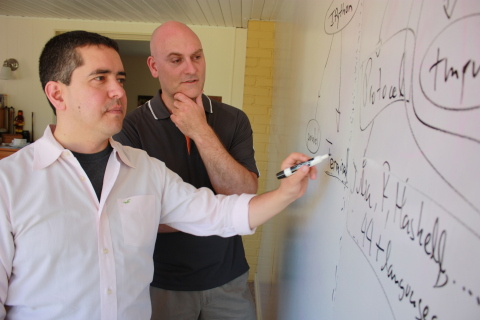University of California
See the following -
$6M for UC Berkeley and Cal Poly to Expand and Enhance Open-Source Software for Scientific Computing and Data Science
 Three foundations pledged $6M over the next three years to Project Jupyter, an open-source software project that supports scientific computing and data science across a wide range of programming languages via a large, public, open and inclusive community. Fernando Perez of University of California, Berkeley and Lawrence Berkeley National Laboratory and Brian Granger of California Polytechnic University, San Luis Obispo will lead the project at their institutions. Perez and Granger’s efforts with Project Jupyter are the result of their work developing IPython, a popular user interface for interactive computing across multiple programming languages.
Three foundations pledged $6M over the next three years to Project Jupyter, an open-source software project that supports scientific computing and data science across a wide range of programming languages via a large, public, open and inclusive community. Fernando Perez of University of California, Berkeley and Lawrence Berkeley National Laboratory and Brian Granger of California Polytechnic University, San Luis Obispo will lead the project at their institutions. Perez and Granger’s efforts with Project Jupyter are the result of their work developing IPython, a popular user interface for interactive computing across multiple programming languages.
- Login to post comments
15 Blockchain Whitepapers Awarded Winners of US Department of Health and Human Services Challenge
 A challenge held by the US Department of Health and Human Services (HHS) to encourage Blockchain use in the Health Information Technology field resulted in 15 winning whitepapers. The Department’s Office of the National Coordinator for Health Information Technology (ONC) first announced the “Use of Blockchain in Health IT and Health-Related Research” challenge in July...
A challenge held by the US Department of Health and Human Services (HHS) to encourage Blockchain use in the Health Information Technology field resulted in 15 winning whitepapers. The Department’s Office of the National Coordinator for Health Information Technology (ONC) first announced the “Use of Blockchain in Health IT and Health-Related Research” challenge in July...
- Login to post comments
A Tale of Two Epidemics — HCV Treatment among Native Americans and Veterans
In light of ongoing debates about health care budgets and rising drug prices, a current public health crisis can provide useful insights. For patients who get their health care through two separate federal agencies, the hepatitis C virus (HCV) epidemic is unfolding in vastly different ways. In recent years, the Department of Veterans Affairs (VA) health care system has mounted a response to HCV that should be the envy of any health system, public or private. On the other hand, the Indian Health Service (IHS), an agency that serves American Indians and Alaska Natives, is struggling to meet the needs of its patients with HCV...
- Login to post comments
Antibiotic Effective Against Drug-Resistant Bacteria in Pediatric Skin Infections
 Methicillin-resistant Staphylococcus aureus (MRSA) is a bacterial scourge. As its name suggests, MRSA is resistant to most common antibiotics and thus difficult to treat, particularly in children where it commonly causes complicated skin and skin structure infections. In a randomized, controlled clinical trial -- the first of its kind -- a multi-institution research team reports that daptomycin, part of a new class of antibiotics currently approved only for use in adults, is effective and well-tolerated in children. The findings are published in the March 2017 issue of Pediatrics...
Methicillin-resistant Staphylococcus aureus (MRSA) is a bacterial scourge. As its name suggests, MRSA is resistant to most common antibiotics and thus difficult to treat, particularly in children where it commonly causes complicated skin and skin structure infections. In a randomized, controlled clinical trial -- the first of its kind -- a multi-institution research team reports that daptomycin, part of a new class of antibiotics currently approved only for use in adults, is effective and well-tolerated in children. The findings are published in the March 2017 issue of Pediatrics...
- Login to post comments
Child Mind Institute's Healthy Brain Network Releases Open Dataset
 The Child Mind Institute today announced the release of the first dataset from the groundbreaking Healthy Brain Network study, and the inauguration of the Healthy Brain Network Biobank. The study and the open access Biobank address the pressing need for a large, comprehensive dataset that researchers will use to leverage new technologies and develop tools for diagnosing and managing mental health and learning disorders...
The Child Mind Institute today announced the release of the first dataset from the groundbreaking Healthy Brain Network study, and the inauguration of the Healthy Brain Network Biobank. The study and the open access Biobank address the pressing need for a large, comprehensive dataset that researchers will use to leverage new technologies and develop tools for diagnosing and managing mental health and learning disorders...
- Login to post comments
Doctors Demand Extreme EHR Makeover ... Right Now
 Just about every week or so there’s a new report chronicling doctors’ frustrations with electronic health records. Drill down a bit and the source of discontent becomes clear: poor usability, clunky interfaces, ineffective search and too many clicks. So what would actually make doctors like their EHR? “They need a tremendous makeover with lots of clinical input to make it easy to do not only the right thing, but the things you do all the time,” said Robert Wachter, MD, a professor of medicine at the University of California, San Francisco.
Just about every week or so there’s a new report chronicling doctors’ frustrations with electronic health records. Drill down a bit and the source of discontent becomes clear: poor usability, clunky interfaces, ineffective search and too many clicks. So what would actually make doctors like their EHR? “They need a tremendous makeover with lots of clinical input to make it easy to do not only the right thing, but the things you do all the time,” said Robert Wachter, MD, a professor of medicine at the University of California, San Francisco.
- Login to post comments
Low-Carb on Trial (Galileo Had It Easy)
A recent exposé in the New York Times[1] revealed massive and pervasive fraud and collusion between the sugar industry and certain medical authorities in the 1960’s designed to erroneously promote saturated fat as the culprit behind heart disease. Effectively diverting attention from the real source of the problem (the increasing consumption of dietary sugar), the food industry conspired with key authorities within the medical establishment to serve their own best interests at the expense of public health. Historic documents showed that they were intentionally concealing the fact that sugar, instead of fat, was knowingly to blame...
- Login to post comments
New Imaging Technique Overturns Longstanding Textbook Model of DNA Folding
 How can six and half feet of DNA be folded into the tiny nucleus of a cell? Researchers funded by the National Institutes of Health have developed a new imaging method that visualizes a very different DNA structure, featuring small folds of DNA in close proximity. The study reveals that the DNA-protein structure, known as chromatin, is a much more diverse and flexible chain than previously thought. This provides exciting new insights into how chromatin directs a nimbler interaction between different genes to regulate gene expression, and provides a mechanism for chemical modifications of DNA to be maintained as cells divide...
How can six and half feet of DNA be folded into the tiny nucleus of a cell? Researchers funded by the National Institutes of Health have developed a new imaging method that visualizes a very different DNA structure, featuring small folds of DNA in close proximity. The study reveals that the DNA-protein structure, known as chromatin, is a much more diverse and flexible chain than previously thought. This provides exciting new insights into how chromatin directs a nimbler interaction between different genes to regulate gene expression, and provides a mechanism for chemical modifications of DNA to be maintained as cells divide...
- Login to post comments
Pharma, Data Veteran Stephen Friend Bites At Apple’s Health Offer
Consumer tech giant Apple, which has spent considerable effort positioning its products as health and fitness helpers, has just hired someone who knows Big Pharma and Big Data. Stephen Friend, a veteran of drug R&D and, more recently, a nonprofit effort to foster more collaborative biomedical research and more data sharing, is joining Apple in an unspecified capacity. The news emerged today from Sage Bionetworks, the Seattle nonprofit that Friend founded after leaving drug giant Merck, where he was a senior research executive for eight years...
- Login to post comments
Scientists Scour the Globe for a Drug to Kill Deadly Brain-Eating Amoeba
The deaths hit the headlines every summer, sometimes five or six of them across the country. They’re newsworthy for their rarity and for how innocuous the events leading up to them are — it’s usually a young person who was swimming in a lake, got some water up their nose, and within days, was dead. The cause is an amoeba called Naegleria fowleri, which when it infects the brain, causes massive swelling that is almost always fatal. Over the past half-decade, 137 people in the US have died of the infection...
- Login to post comments
tranSMART Foundation Announces Keynotes for 2016 Annual Conference
 The tranSMART Foundation, a non-profit organization providing a global, open-source, open-data knowledge management platform for scientists to share pre-competitive translational research data, today announced its keynote speakers for its 2016 tranSMART Annual Meeting at the University of California, San Diego (UCSD) in La Jolla, Calif., October 25-27, 2016. The keynotes for this year's conference include industry experts in various areas of translational medicine, including...
The tranSMART Foundation, a non-profit organization providing a global, open-source, open-data knowledge management platform for scientists to share pre-competitive translational research data, today announced its keynote speakers for its 2016 tranSMART Annual Meeting at the University of California, San Diego (UCSD) in La Jolla, Calif., October 25-27, 2016. The keynotes for this year's conference include industry experts in various areas of translational medicine, including...
- Login to post comments
What Would It Take to Mainstream "Alternative" Agriculture?
 The industrialized food system, studies have shown, is linked to greenhouse gas emissions, algal blooms, pesticide pollution, soil erosion and biodiversity loss, to name a few ecological troubles. Add to this a long list of social ills, from escalating rates of obesity to the demise of the family farmer and deadening of rural landscapes and rural economies across much of the U.S...
The industrialized food system, studies have shown, is linked to greenhouse gas emissions, algal blooms, pesticide pollution, soil erosion and biodiversity loss, to name a few ecological troubles. Add to this a long list of social ills, from escalating rates of obesity to the demise of the family farmer and deadening of rural landscapes and rural economies across much of the U.S...
- Login to post comments